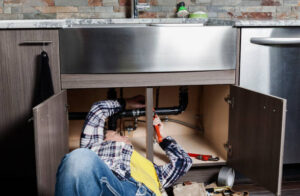Replacement of Emergency Water Heaters: When Should One Act?
You’re lounging in a nice shower at home after a demanding day. Suddenly you are hit with a cold blast of water, a horrible wake-up call realizing your water heater has given up on you. Indeed, a malfunctioning water heater can be a disruptive and annoying occurrence. How then would you find out when an emergency water heater replacement is required? Let us begin straight forward and review the indicators for which you should respond right away.

One of the most obvious indicators your water heater is about to fail is age. Usually running from 8 to 12 years, water heaters should be replaced with careful consideration whether yours falls in that range or much older. Along with greater vulnerability to failures, water heaters age and lose efficiency. Act now to avoid accidental cold showers in not too distant future, not waiting for it to completely give up on you.
Age is not the sole factor even if it is a main one. Leaks provide still another clue your water heater is screaming for a replacement. A little puddle at the base of your heater could indicate a serious problem, even if it would not look like much. Leaks can cause significant water damage as well as over time mold development. Under these conditions, it might be wiser to spend money on a new water heater than on costly repairs.
Unusual sounds from your water heater point to another telling sign something is wrong. Should your heater start to hum, pop, or crack, it is important to take attention. Usually showing tank silt collection, these noises could threaten the efficiency and operation of the water heater. Apart from addressing the issue, a new water heater ensures a more peaceful and quiet home free from the disruptive noises coming from your basement.
Has someone dropped the hot water supply anywhere? This would mean that your water heater is losing capacity to satisfy demand. If you find yourself always running out of hot water even after modest consumption, you might consider an emergency water heater replacement. Apart from making sure you have enough hot water, a contemporary water heater will enable you to avoid the inconvenience of changing daily activities to meet a limited hot water availability.
If you find consistent and recurrent repairs, at last it could be time to say goodbye to your old water heater. Though little maintenance is required, ongoing outages can raise questions about a failing system. A better long-term investment than paying for continuous repairs out of your hard-earned money is a new, reliable water heater.
About your water heater, you should be on lookout for warning signals for an emergency replacement. If age, leaks, unusual sounds, low hot water supply, and frequent repairs point to, your water heater is nearing its last years. Apart from giving you piece of mind, investing in a new water heater will help you prevent the trouble caused by unanticipated breakdowns. Thus, be vigilant for these symptoms and, should necessary, do not hesitate to react.

Steps to Take Should Your Water Heater Suddenly Not Work
How should you handle a broken water heater? Replacement Emergency Water Heaters
oh no! Usually, a winter morning finds you leaping into the shower only to be greeted with a stinging blast of icy cold water. Your water heater deciding to call it quits results in your shivering and uncertainty. Let yourself relax; we got you covered! This essay will walk you through the steps you should follow when your water heater suddenly breaks down so you may promptly address the issue and get back to enjoy a warm and cosy shower.
Check the source of power. Finding out whether your water heater runs on power comes first easiest. A tripped circuit breaker sometimes causes an unplanned cessation in the hot water supply. See if head over to your electrical panel any circuits have tripped. Should you find one, merely flip it back on to see whether it solves the problem.
Look at the Pilot Light. A malfunctioning pilot light is the usual reason gas water heaters suddenly shut off. See whether the pilot light of your water heater still is on by locating the burner chamber. If not, attentively follow manufacturer instructions to relight it. Though it would be better left to experts if you cannot relight the pilot light if it keeps going out.
Empty and Clear the Tank Gradually building inside your water heater, mineral deposits and sediments can reduce heating effectiveness and ultimately cause your water heater to fail entirely. At least once a year cleansing and draining the tank helps to avoid this buildup. This minor maintenance task will extend the life of your water heater and avert unneeded breakdowns.
Review the Thermostat Adjustments. Usually about 120 F, adjust your thermostat to the desired level and check it hasn’t been unintentionally adjusted. Inaccurate thermostat settings could result in inadequate warmth or perhaps total shutdown of a water heater. Change the temperature and wait to see whether the hot water once more flows should it be needed.
Wrap Your Pipework for Hot Water Should you have followed all the above rules and still discover that your water heater is not operating, heat loss from uninsulated pipes could be the source. Foam pipe insulation guarantees that hot water reaches your faucets more efficiently and helps to reduce heat loss.

See a Professional Engineer Plumber Should all else fail and your water heater still not be operating, you should contact the experts. A qualified plumber can completely discover any underlying problem, including damaged thermostats, malfunctioning heating elements, or any other one. They will guide you through the options, which can call for a replacement emergency water heater should need.
Although managing a broken water heater can be scary, with the right measures and expert assistance you will have a warm shower in no time. When necessary, be sure not to hesitate to ask for help; fast action can prevent more damage and save you unnecessary effort.
Therefore, just follow these instructions and the complication of a broken water heater will be history the next time your water heater decides to take an unplanned vacation. Moreover keep in mind that, although a luxury, a hot shower is a necessary for our comfort and well-being. Keeping tiptop condition for your water heater will enable it to run for many years to come with economy.

